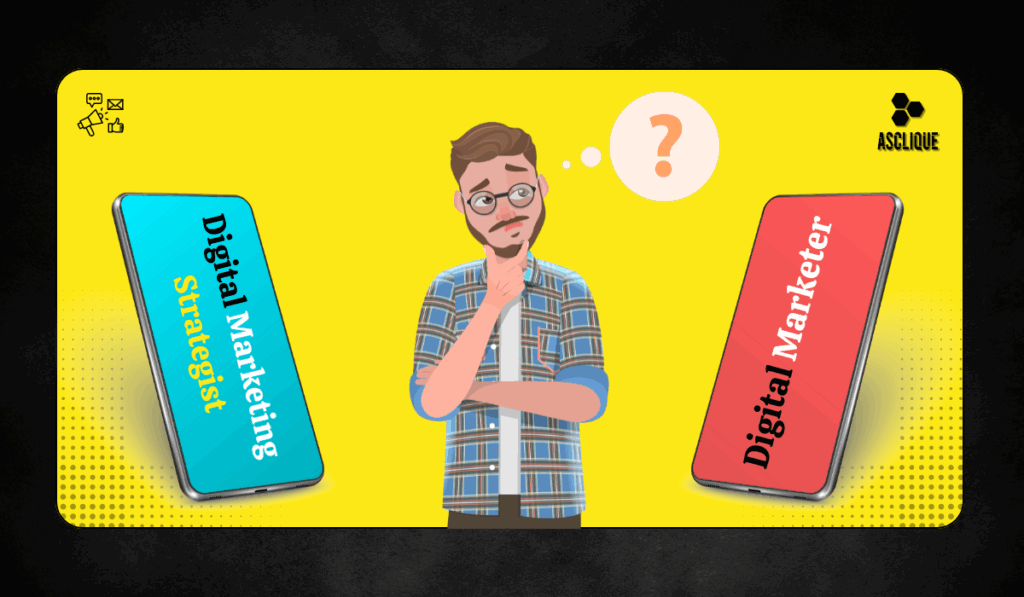In today’s online world, marketing is more than just running ads or writing posts. It’s strategy, implementation, metrics, and pivoting quickly. When businesses look to grow online, they typically find two roles—digital marketing strategist and digital marketer. While they appear to be synonymous, they have distinct roles in building a thriving web presence.
Understanding the difference between the two can help business owners hire the right talent and aspiring professionals choose the right career path.
Who is a Digital Marketing Strategist?
A digital marketing strategist is the person behind the plan. They don’t just execute tasks—they design the full roadmap. Their role is to look at a business’s online presence from a bird’s-eye view and build a custom strategy to meet specific goals.
Key Responsibilities of a Digital Marketing Strategist:
- Competitor and market analysis.
- Setting business goals and establishing them as marketing goals.
- Creating detailed digital plans for SEO, social media, email, and content.
- Working with cross-functional teams to manage the execution of marketing campaigns.
- Measuring performance metrics and adjusting the strategy as required.
Who is a Digital Marketer?
A digital marketer is responsible for implementing day-to-day operations of the strategy. They are the ones who design content, run ad campaigns, manage social media presence, and track campaign performance.
Core Responsibilities of a Digital Marketer:
- Executing SEO best practices
- Managing Google Ads, Facebook Ads, or other paid campaigns
- Writing blogs, social media posts, or email newsletters
- Handling analytics and reporting
- Making regular updates to websites and landing pages
Strategy vs Execution: A Simple Breakdown
| Criteria | Digital Marketing Strategist | Digital Marketer |
| Role Focus | Planning and long-term vision | Day-to-day execution |
| Skills Required | Market analysis, strategic thinking | Content creation, ad management |
| Interaction with Business Goals | High-level alignment | Task-specific alignment |
| Reporting | Builds and reviews performance data | Tracks KPIs and shares updates |
| Team Involvement | Works across all departments | Works within marketing team |
Which Role is More Analytical?
Digital marketing strategists deal with more data, trends, consumer behavior, and competitor analysis. They use Google Analytics, SEMrush, and HubSpot to develop data-driven strategies.
Digital marketers, while also data-driven, use these metrics to make tweaks to individual campaigns—like the copy for an ad or trying out a new type of post on Instagram.
So, while both operate with metrics, strategists operate more at the macro level, and marketers operate more at the micro level.
Tools Each Role Commonly Uses
Digital Marketing Strategist:
- SEMrush / Ahrefs (for SEO and competition analysis)
- HubSpot / Salesforce (for marketing automation and customer journey mapping)
- Google Analytics (for strategic optimization and monitoring)
- Trello / Asana (for team-based campaign management)
Digital Marketer:
- Canva/Adobe Suite (for content design)
- Facebook Ads Manager/Google Ads (for running campaigns)
- Mailchimp/Constant Contact (for email marketing)
- WordPress/Shopify (for updating website content)
The strategist often chooses the tools, while the marketer uses them in execution.
When Does a Business Need a Digital Marketing Strategist?
It’s worth hiring a digital marketing strategist when:
- You’re rolling out a large-scale product or service
- Your current marketing isn’t regularly driving ROI
- You’re expanding into new markets or segments
- You need an integrated marketing plan across platforms
- You’re investing heavily digitally and want measurable growth
Without strategy, even great marketers get lost. In a recent survey by Smart Insights, 47% of marketers indicated that the biggest issue with digital campaigns was the absence of strategic direction.
Career Growth and Opportunities
For professionals in the digital field, understanding where these roles lead is key.
Digital Marketing Strategist Career Path:
- Strategy Assistant → Junior Strategist → Marketing Strategist → Head of Digital Strategy → CMO
Digital Marketer Career Path:
- Marketing Assistant → Digital Marketing Executive → Specialist (SEO, PPC, etc.) → Digital Marketing Manager
With experience, many digital marketers move into strategist roles as they develop a broader understanding of strategy and performance.
Certifications and Education
While degrees in marketing, business, or communication are common for both roles, specific certifications can offer an edge.
For Digital Marketing Strategists:
- Google Analytics Certification
- HubSpot Content Strategy Certification
- LinkedIn Digital Marketing Strategy Course
For Digital Marketers:
- Google Ads Certification
- Facebook Blueprint Certification
- SEMrush SEO Toolkit Certification
Certifications help demonstrate specialized knowledge and credibility in a competitive field.
Conclusion
While both are required in digital marketing, they function differently with a digital marketing strategist building the journey and ensuring every step is business-focused. A digital marketer walks that journey—running campaigns, creating content, and adjusting strategies.
For businesses, knowing the difference helps them make smarter recruitment choices. For the person, it’s about whether your skill set is strategic thinking or execution.
Both roles are needed as the digital world gets tougher and tougher to navigate. Together, they help ensure your brand doesn’t just survive but thrives online.
FAQ’s
What’s the main difference between a strategist and a marketer?
A strategist formulates the overall marketing strategy and objectives, while a marketer is responsible for daily execution like content, advertisements, and reports.
Can one person do both roles?
Yes, especially in small firms. But in large corporations, the jobs are typically different to facilitate focus and result.
Is strategist a good role for analytical minds?
Yes, it’s also best for individuals who enjoy planning, data analysis, and aligning marketing tasks with business goals.
Which role is better for beginners?
Starting as a digital marketer is best. It builds hands-on experience, which comes in handy before stepping into a role as a strategist.

